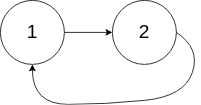leetcode-cn Daily Challenge on October 10th, 2020.
leetcode Daily Challenge on October 27th, 2020.
Difficulty : Medium
Related Topics : LinkedList、Two Pointers
Given a linked list, return the node where the cycle begins. If there is no cycle, return
null.There is a cycle in a linked list if there is some node in the list that can be reached again by continuously following the
nextpointer. Internally,posis used to denote the index of the node that tail'snextpointer is connected to. Note thatposis not passed as a parameter.Notice that you should not modify the linked list.
- Can you solve it using
O(1)(i.e. constant) memory?Input: head = [3,2,0,-4], pos = 1 Output: tail connects to node index 1 Explanation: There is a cycle in the linked list, where tail connects to the second node.Input: head = [1,2], pos = 0 Output: tail connects to node index 0 Explanation: There is a cycle in the linked list, where tail connects to the first node.Input: head = [1], pos = -1 Output: no cycle Explanation: There is no cycle in the linked list.
- The number of the nodes in the list is in the range
[0, 10^4].-10^5 <= Node.val <= 10^5posis-1or a valid index in the linked-list.
- mine
- Java
Runtime: 0 ms, faster than 100.00%, Memory Usage: 39.4 MB, less than 6.32% of Java online submissions//O(N)time // O(1)space public ListNode detectCycle(ListNode head) { if(head == null){ return null; } ListNode fast = head; ListNode slow = head; while(fast.next!=null &&fast.next.next!=null){ fast = fast.next.next; slow = slow.next; if(fast == slow){ ListNode slow2 = head; while (slow2 != slow){ slow = slow.next; slow2 = slow2.next; } return slow; } } return null; }
- Java


